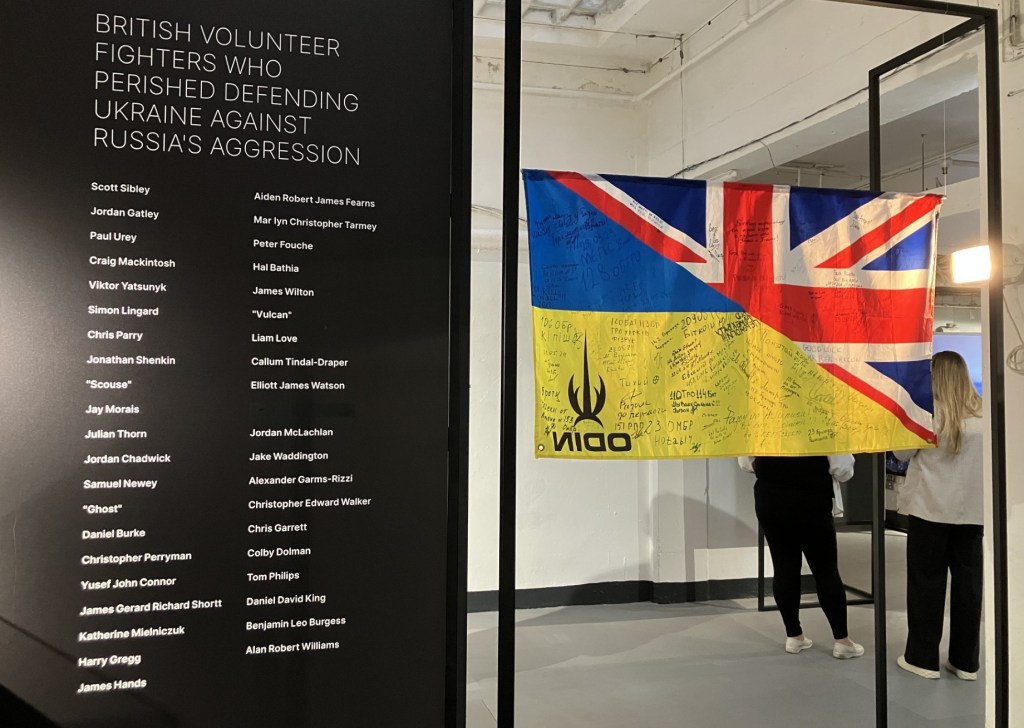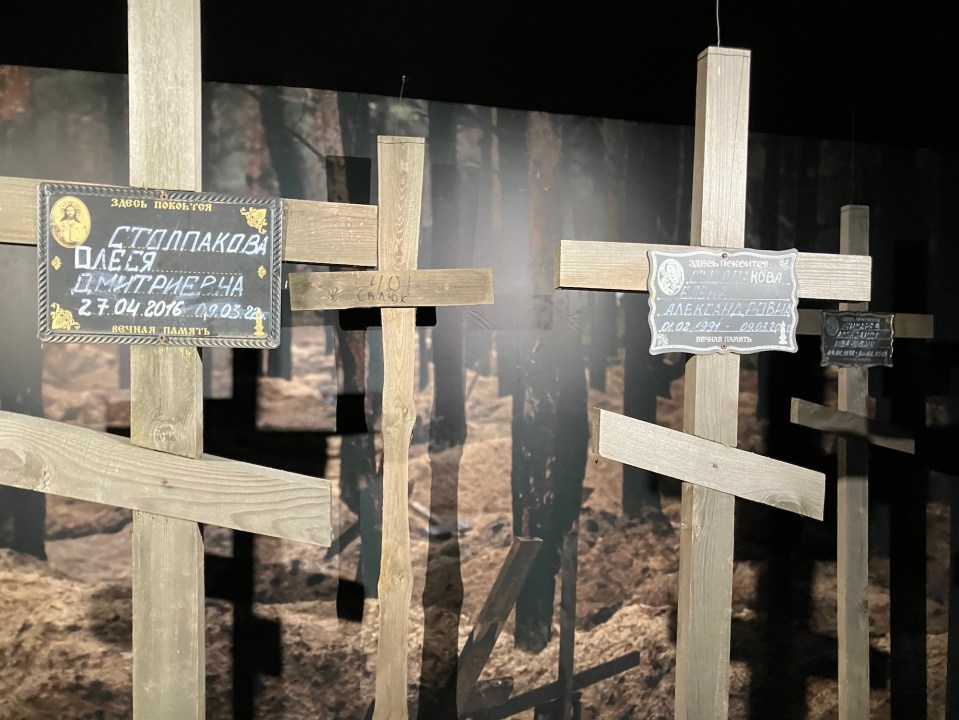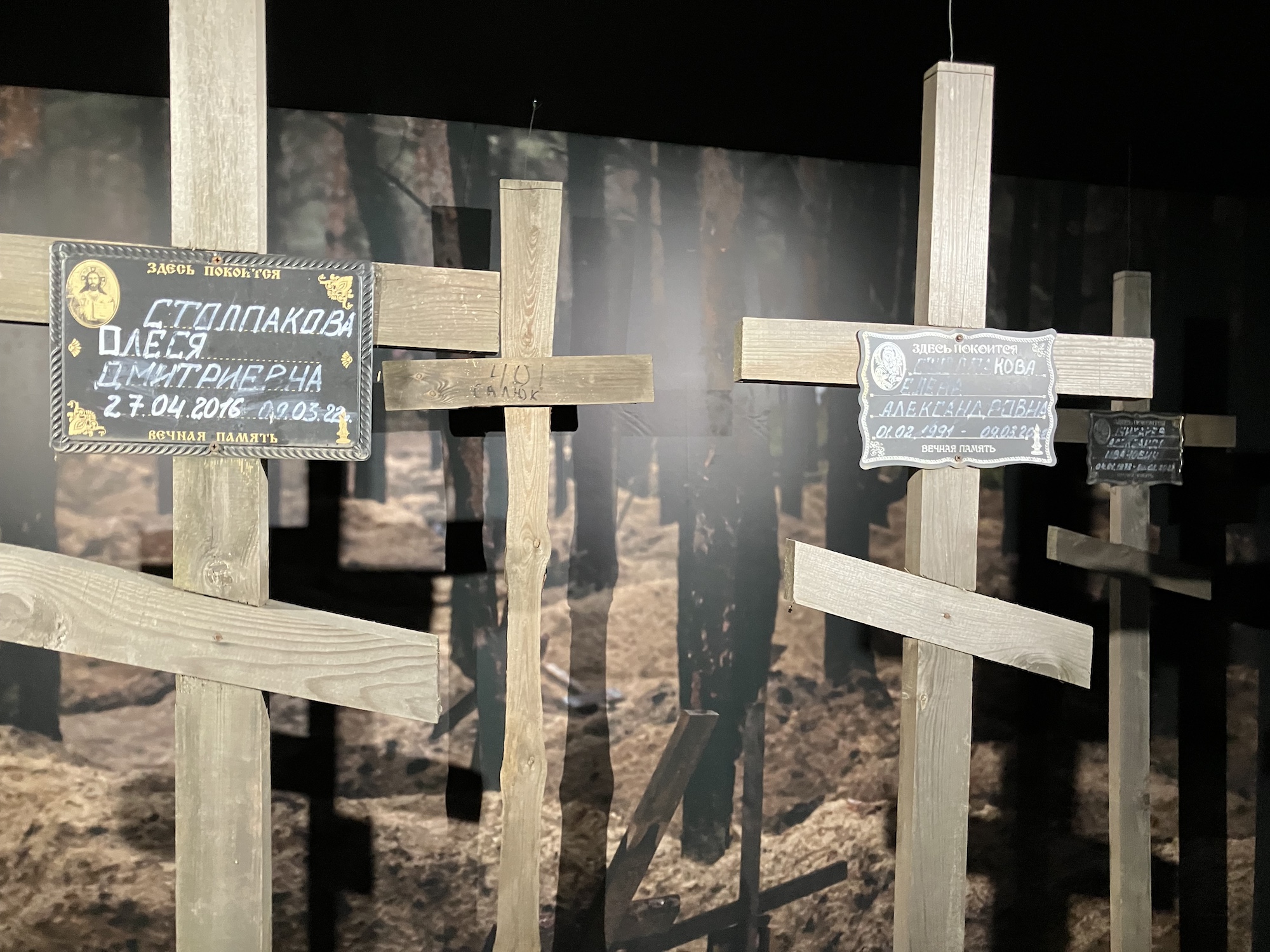Last week, a West End arts venue hosted ‘Indomitable Ukraine’, a war artefacts exhibition with everything from prosthetic legs to captured Russian battle plans. It was put on by the War Museum of Ukraine and had an added poignancy for British audiences. On a black memorial board was a list of nearly 40 names of British citizens who have died while serving with Ukraine’s International Legion – or, as the memorial puts it: ‘defending Ukraine against Russia’s aggression.’
As things currently stand, there are no plans for any permanent British memorial to those who have fought for Ukraine
Families of the fallen were invited to a special showing of the exhibition last week, where they had a personal audience with Kyiv’s ambassador to London, General Valerii Zaluzhnyi. He led Ukraine’s defence in the war’s first two years, and is regarded as a living legend. Gratifying as it may be, though, to be thanked by Ukraine’s answer to Montgomery or Patton, that is so far as public recognition goes.
The exhibition shut on Monday, and as things currently stand, there are no plans for any permanent British memorial to those who have fought for Ukraine. An estimated 2-3,000 Britons have served with Ukraine’s International Legion, making it the biggest volunteer mobilisation of its kind since George Orwell fought in the Spanish Civil War. Yet the British government, despite cheerleading Kyiv from afar, has been notably silent about their role. No welcome parades when they come home from the front. No medals, or warm words of congratulation from our Prime Minister. And no public monument to commemorate either them or the dead – not even a temporary residency on Trafalgar Square’s Fourth Plinth.

Some will argue this is hardly surprising. HMG after all, has never approved of its citizens freelancing in foreign wars, be it in Ukraine or anywhere else. Officially, the government warns UK citizens they could face prosecution for fighting in Ukraine, just as it did with volunteers for the International Brigade in the 1930s. While in practice that has never happened, it is one thing to quietly condone the role of Ukraine’s British volunteers, and another to publicly celebrate them.
It would surely be a shame, though, if the contribution of British volunteers went entirely forgotten. It would also jar with how Britain remembers the 2,000 British volunteers who served with Spain’s International Brigade from 1936-39. There are more than 100 memorials to them up and down the country, in parks, town squares and city halls. Nor is their valour just celebrated in the civic space. Popular culture has cast them as the epitome of the noble, romantic freedom fighter, in the manner of Che Guevara and Nelson Mandela. The Clash and the Manic Street Preachers wrote songs in their praise. The director Ken Loach recorded their struggle in his 1995 film Land and Freedom.
That, however, is not how Ukraine’s Legionnaires are often seen in the media, which often portrays them as thrill-seeking dogs of war, whose only real cause is themselves. True, a minority are like that – and so too, probably, were some of those in Spain. So why is one group celebrated and the other largely ignored? After all, both were ‘just’ wars to fight in, defending an elected government against violent overthrow.
One big difference with the Spanish volunteers is that most were drawn from Communist parties in their home countries, which were keen for their members to do their bit to support Spain’s Socialist-led government. The parties not only helped the volunteers reach Spain, but also sent political commissars to keep a close watch on them. Hence they generally toed the party line that it was all about fighting fascism, and not about having an adventure that also helped them escape Depression-era Britain. That is also the narrative told in the memorial and plaques to them nationwide – many erected by trade unions and Labour-run town halls.
The Ukrainian volunteers, by contrast, have no political sponsors urging them to go. In my three years covering the war for the Daily Telegraph, I have interviewed dozens of them, and most are candid about their motives. Although some do see themselves as modern-day Orwells, others admit to also feeling bored in the safe, cossetted West, and wanted to see if they could handle full-on warfare of the kind their forefathers did. It is, in other words, as much Fight Club as Homage to Catalonia. Many – especially the ex-soldiers among them – also like the fact that Ukraine is a country where military men are still championed. They feel valued in a way that they don’t back home, where warrior values are no longer fashionable, or lumped in lazily with agendas on ‘toxic masculinity’. Quite a few have even told me that they plan to settle in Ukraine once the war is over, seeing more of a future there than in their own country.
These are not the kind of people the modern-day commissars running our town halls, unions and public spaces are much interested in. The majority I have met are white, working-class men – the same constituency, as it happens, that made up most of Spain’s International Brigade – but these days, not exactly flavour of the month. On that same basis, we will probably not see any British arthouse film directors doing a Ukraine version of Land and Freedom.
All is not lost. Sources at the Ukrainian Embassy say that when the war is over, it may construct its own memorial to the Legionnaires at its building in Holland Park. Others, though would prefer something a little more prominent – like the main Spanish Civil War monument in London, which sits on the South Bank next to the old HQ of the GLC, whose councillors funded it. And if the great and the good won’t push for it, there are ex-Legionnaires who will.
Macer Gifford is a former Tory councillor who also fought alongside Kurdish anti-Isis volunteers in Syria. He served on-off for the first two years of Ukraine’s war, and is perhaps the closest thing the Legion has to an ‘influencer’. His Twitter feed – straplined ‘Channeling the spirit of Orwell’ – has nearly 150,000 followers.
‘I am very keen to see a memorial to Ukraine, and would be happy to raise some funds for it through my own followers,’ he told me. ‘The volunteers have fought for what we consider as fundamentally British values – liberty, freedom from oppression. It would also be an enduring moment to Britain’s friendship with Ukraine – and a place where the children of those who’ve died can pay tribute in future.’
Money isn’t the only issue. Monuments, especially prominent ones, usually require planning permission – and with them comes controversy. While Legion memorials might not get much public opposition (even the anti-Nato wing of the left has largely grasped that Putin is a badun), there could be objections from people worried about it drawing the Kremlin’s ire.
Still, monuments to those who fought in Ukraine would surely be a fitting epitaph, especially given Starmer signed earlier this year a 100-year partnership with Kyiv, which is designed to foster cultural links as well security cooperation. Starmer will be long gone in a hundred years, as indeed will the surviving Legionnaires. Starmer will be long gone in a hundred years, as indeed will the surviving Legionnaires. Their bravery, though, surely deserves to be remembered for this century and beyond.
Colin Freeman is the author of The Mad and the Brave, the Untold Story of Ukraine's Foreign Legion.








Comments